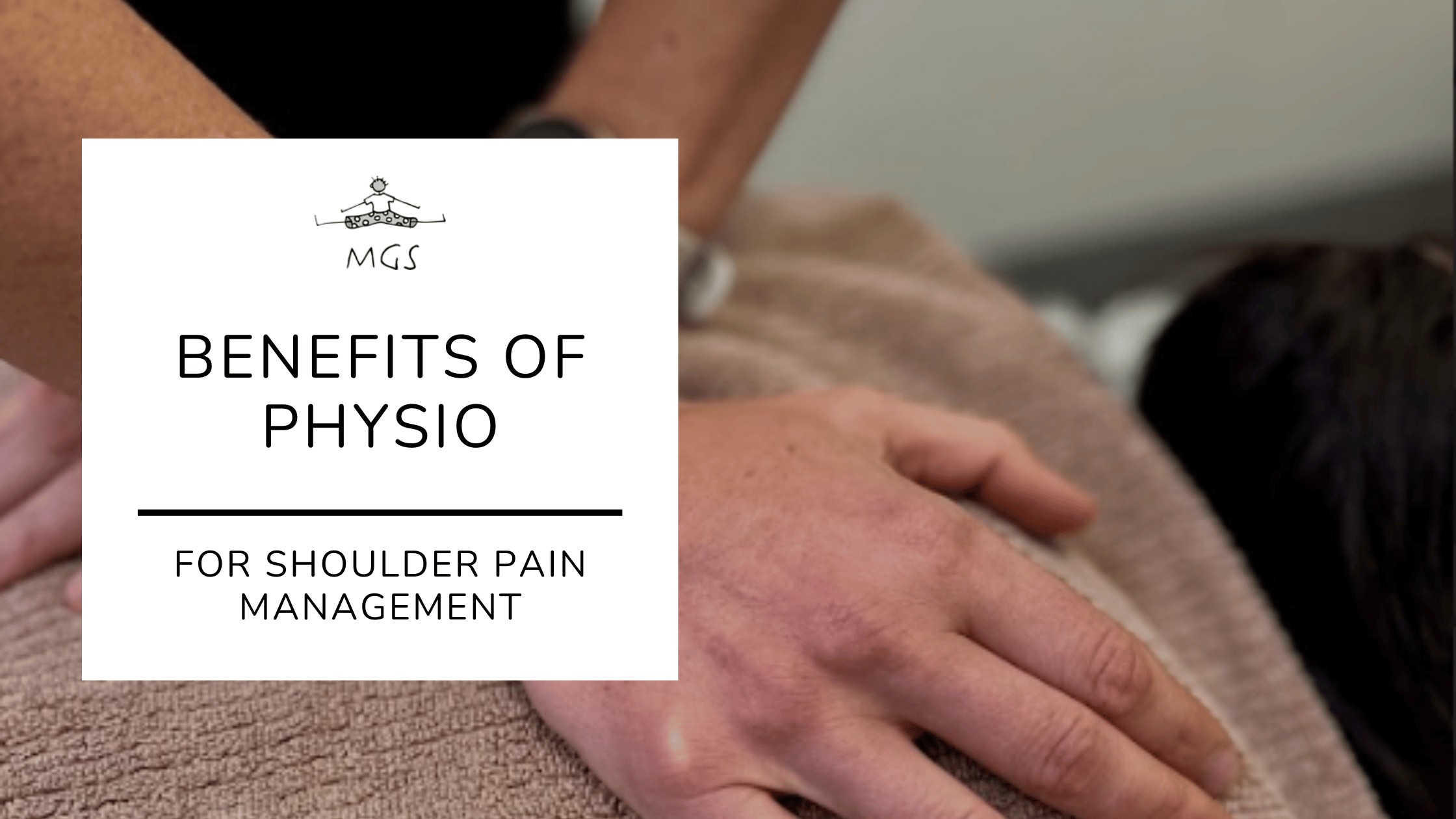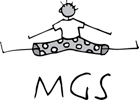Shoulder pain is a common issue among active people, athletes, and anyone engaged in repetitive arm movements. Whether you’re lifting weights, throwing a ball, carrying kids, or working at a desk all day, shoulder pain can significantly impact your daily life, work productivity, and sports performance. It can also interfere with simple tasks like carrying grocery bags or throwing a ball, making it essential to address the issue promptly.
Key Takeaways
- Physio for shoulder pain promotes faster healing and better movement.
- Early intervention prevents chronic pain and re-injury.
- Treatment plans are tailored to your sport, work, and lifestyle needs.
- MGS Physiotherapy combines hands-on care with personalised exercises for long-term results.
Understanding Shoulder Pain
The shoulder is the most mobile joint in the body, allowing a wide range of movements. The shoulder joints are complex and highly mobile structures composed of bones, ligaments, and muscles, which makes them particularly susceptible to injury. However, this mobility also makes it more prone to injuries. Common causes of shoulder pain include:
- Rotator cuff injuries: Tears or strains of the stabilising muscles.
- Bursitis or impingement: Inflammation due to repetitive overhead movements.
- Tendonitis: Irritation of tendons from overuse.
- Frozen shoulder (adhesive capsulitis): Stiffness and pain limit movement.
- Shoulder instability or dislocations: Often from falls or contact sports.
- Shoulder injury: A shoulder injury refers to any damage to the structures of the shoulder joints, such as muscles, tendons, ligaments, or bones, and can result from trauma, overuse, or repetitive strain.
Common symptoms of shoulder injuries include pain, swelling, and limited range of motion.

Understanding what makes your symptoms worse or better, such as specific activities or movements, is important for accurate diagnosis and effective treatment planning.
If left untreated, shoulder pain can lead to weakness, loss of range of motion, and long-term dysfunction affecting your sport, work, and daily tasks.
How Physio Helps Manage Shoulder Pain
1. Accurate Assessment and Diagnosis of Shoulder Impingement
Physiotherapy starts with a detailed assessment to identify the root cause of your pain. Your MGS physio will assess:
- Range of motion and joint mobility
- Muscle strength and balance
- Postural alignment
- Biomechanics during sport-specific or daily activities
- Injury history and lifestyle factors
Understanding the true source of your pain ensures that treatment targets the underlying issue, not just the symptoms.
2. Tailored Treatment Plans
No two shoulder injuries are the same. Your MGS physiotherapist will create a treatment plan customised to:
- Reduce pain and inflammation
- Restore flexibility and joint mobility
- Improve muscle activation and control
- Strengthen supporting muscles to stabilise the joint
Your plan will include realistic and achievable goals to help you return to your chosen activities safely and confidently. As part of your treatment, your physiotherapist will design a tailored exercise program to promote healing, improve strength, and support your recovery.
3. Hands-On Manual Therapy
Manual therapy is a core component of sports physiotherapy. At MGS, physiotherapists use techniques such as:
- Soft tissue massage to release tight muscles and fascia
- Joint mobilisation to restore normal movement patterns
- Trigger point therapy to reduce muscle tension
- Dry needling (when appropriate) to relieve deep muscle tightness
These therapies can relieve pain and provide short-term relief by reducing irritation and sensitivity in overworked muscles. Relieving pain is an important part of the overall rehabilitation process. These techniques reduce pain, improve circulation, and enhance joint mobility, creating the foundation for effective rehabilitation.
4. Personalised Exercise Programs
Exercise therapy plays a critical role in recovering from shoulder pain. Your physio will guide you through:
- Mobility exercises: Gentle stretches to regain range of motion.
- Strength exercises: These target the rotator cuff, scapular stabilisers, muscles around the shoulder blades, and the posterior deltoid for improved shoulder support, stability, and mobility.
- Postural retraining: Improving neck, upper back, and shoulder alignment.
- Functional rehabilitation: Exercises mimicking sport or daily activities to build confidence and prevent re-injury.
The sleeper stretch is a specific exercise designed to increase internal rotation flexibility and target tightness in the posterior capsule. Additionally, the pendulum stretch is an effective exercise to increase shoulder mobility and flexibility after a shoulder injury.
These exercises are progressively advanced as your pain reduces and strength improves, ensuring you build resilience for long-term results. Always keep your hips facing forward during exercises to maintain proper alignment and safety. If you experience pain or feel pain during any movement, stop the exercise immediately and inform your physio. Performing rehabilitation exercises 2 to 3 days a week can maintain strength and range of motion in your shoulders. These exercises are designed to relieve shoulder pain and improve function following injury or surgery.
a. Using Resistance Bands in Shoulder Rehabilitation
Incorporating resistance bands into your shoulder rehabilitation strengthens the shoulder muscles supporting the shoulder joint, especially the rotator cuff muscles. Resistance band exercises target internal and external rotation, which are essential for improving shoulder stability and preventing further injury.
Start with a low-tension resistance band to avoid aggravating shoulder pain, and gradually increase resistance as your affected shoulder strengthens and pain decreases. Regular resistance band shoulder exercises enhance muscle strength, boost shoulder stability, reduce the risk of further injury, and promote a pain-free shoulder with improved shoulder function and overall shoulder health.
b. Internal and External Rotation Exercises for Shoulder Strength
Internal and external rotation exercises are key to strengthening the rotator cuff muscles and stabilising the shoulder joint. For internal rotation, hold a resistance band or a lightweight object in your affected arm with your elbow bent at 90 degrees and your upper arm close to your body. Slowly rotate your arm inward across your body, pause, then return to the start.
For external rotation, keep the same position but rotate your arm outward away from your body, then return. Perform these movements slowly and controlled to effectively activate muscles, support shoulder function, and reduce pain or injury risk. Incorporating these exercises with a resistance band improves shoulder strength and stability for daily activities and sports.
5. Education for Self-Management
A key part of physio is educating you about your injury and empowering you to manage it. Your MGS physio will teach you:
- How to modify activities to reduce strain on your shoulders
- Ergonomic tips for desk work, lifting, or sports technique
- Strategies to prevent re-injury, including warm-ups and movement corrections. A proper warm-up before starting exercises is essential to prepare the shoulder muscles, increase blood flow, and help prevent injury.
This knowledge ensures you maintain improvements beyond the treatment sessions.
Benefits of Early Physiotherapy Intervention
Seeking physio for shoulder pain early offers key benefits. Gentle, targeted exercises in the initial stages improve mobility and reduce stiffness without causing pain. The best time to see a physiotherapist is as soon as shoulder pain affects your daily activities.
✔ Faster Recovery: Targeted physio accelerates healing and prevents compensation injuries.
✔ Pain Relief: Hands-on therapy and exercises reduce inflammation and discomfort.
✔ Improved Mobility: Restores full range of motion to prevent stiffness and chronic issues.
✔ Injury Prevention: Strengthening and education lower the risk of re-injury.
✔ Return to Activity: Early intervention helps you safely resume sports and daily tasks.
Preventing Future Shoulder Injuries
Preventing future shoulder injuries is vital for maintaining a healthy, pain-free shoulder joint. Regularly performing strengthening exercises targeting the rotator cuff and key shoulder muscles helps provide the stability your shoulder needs for everyday activities and sports.
Maintaining good posture throughout the day reduces unnecessary shoulder strain. Be mindful of your shoulder position during activities and avoid heavy lifting or repetitive overhead movements that increase the risk of impingement. Taking breaks to stretch and move your shoulders can also help reduce stiffness and pain.
Stay alert to any signs of shoulder discomfort, such as pain, stiffness, or limited range of motion. If you notice symptoms of shoulder injury, seek advice from a healthcare professional promptly. By being proactive, you can keep your shoulders strong and functional for years to come.
Physiotherapy for Long-Term Shoulder Health
Physiotherapy is vital for long-term shoulder health, providing a customised treatment plan for various shoulder conditions like chronic shoulder pain or a dislocated shoulder. Your physical therapist will guide you through key exercises for the shoulder, including internal and external rotation, shoulder blade squeezes, and resistance band workouts to improve shoulder stability, relieve pain, and enhance shoulder function.
Education on maintaining proper posture, correct body mechanics, and injury prevention strategies is also provided to support your shoulder health beyond the clinic. Physiotherapy can avoid the need for surgery in many shoulder pain cases.
Committing to regular physiotherapy treatment helps manage shoulder pain, recover from injuries, and reduce the risk of chronic shoulder pain, empowering you to enjoy a pain-free shoulder and an active lifestyle. Always consult an experienced physiotherapist or healthcare professional to ensure your customised treatment plan is safe and effective.
Why Choose MGS Physiotherapy for Shoulder Pain?
At MGS Physiotherapy, our experienced team provides comprehensive shoulder pain management through:
- Tailored Treatment Plans: Your injury, goals, and lifestyle are central to your care.
- Hands-On Expertise: Combining manual therapy with targeted exercises for optimal results.
- One-on-One Care: Each session focuses entirely on you and your needs.
- Sports Physio Focus: Ideal for amateur athletes and active individuals wanting to return to performance quickly.
- Friendly, Professional Approach: Clear communication, realistic goal-setting, and genuine care every step of the way.
Learn more about our comprehensive physiotherapy services designed to help you recover from shoulder pain and return to your active lifestyle.
Facilitating a Safe Return to Sport and Life
Whether you are an amateur swimmer, recreational surfer, gym-goer, or simply want to lift your kids pain-free, physio for shoulder pain can help you achieve these goals efficiently. MGS Physiotherapy’s evidence-based approach ensures you are not only treated for pain relief but also strengthened and educated to prevent future injuries.
Shoulder pain does not have to keep you from the activities you love. Physiotherapy is not just for elite athletes; it benefits anyone who wants to move well and live an active, pain-free life.
Book Your Physio Appointment Today
Don’t wait for shoulder pain to worsen or limit your daily activities. Early assessment and intervention lead to the best outcomes.
CALL NOW TO BOOK YOUR APPOINTMENT
